Hopes that recruiting a respected jurist to lead the Justice Department might help heal the distrust in America’s top legal institutions quickly evaporated after attorney-general nominee Merrick Garland made bogus and legally baseless claims to argue that Antifa didn’t qualify as a domestic terrorism group.
Garland—a federal judge best known for getting snubbed by the GOP Senate when he was nominated to fill Justice Antonin Scalia’s vacancy on the US Supreme Court—is likely to be confirmed this week as America’s top lawman.
But that does not bode well for law-enforcement arm of the legal system, the New American reported.
Sen. Josh Hawley, R-Mo., asked Garland during his confirmation hearing on Tuesday, “Do you regard assaults on federal courthouses or other federal property as acts of domestic extremism, domestic terrorism?”
As with other politically sensitive questions, Garland avoided proffering a direct response. But his lengthy, circuitous rationalization of Antifa’s anarchist violence was no less alarming.
“Well, Senator, my own definition [of terrorism], which is about the same as the statutory definition, is ‘the use of violence—or threats of violence—in attempt to disrupt the democratic processes,'” Garland began.
“So an attack on a courthouse, while in operation, trying to prevent judges from actually deciding cases, that plainly is domestic extremism, domestic terrorism,” he continued. “An attack simply on a government property at night, or any other kind of circumstances, is a clear crime and a serious one, and should be punished.”
In other words, Garland supported calling the pro-Trump demonstration at the US Capitol a terrorist act since it happened during the day, while Antifa’s attacks on federal courthouses and other buildings did not qualify since they occurred at nighttime.
Dozens died as the result of the nationwide race-riots, which lasted, in some urban centers like Seattle and Portland, for months.
That included taking over a local police precinct and barricading several blocks of downtown Seattle, which anarchist rioters dubbed the “Capitol Hill Autonomous Zone.”
No federal charges have yet been announced in the CHAZ occupation, which Seattle’s Democrat mayor, Jenny Durkan, quickly dismissed as a “summer of love.”
Nonetheless, those violent attacks—and the Left’s persistent refusal to condemn or even acknowledge them—likely played a direct role in inciting the mostly right-wing Jan. 6 counter-strike at the US Capitol.
Air Force veteran Ashli Babbitt was shot by Capitol Police during the melee. Several others, including Capitol Police Officer Brian Sicknick, also died of medical-related causes linked to the uprising.
But despite Garland’s claim, there was limited disruption to the democratic process as the House and Senate were able to reconvene later that night in joint session to complete the tallying if Electoral College votes and declare Democrat Joe Biden as president.
Lawmakers, meanwhile, have responded with even greater disruptions to the exercise of First Amendment rights by relentlessly pursuing federal felony charges against those who entered the Capitol—even though many did so in a peaceful and orderly fashion.
Democrats also oversaw the mobilization of some 25,000 National Guard troops to preside over Biden’s inauguration, with thousands expected to remain in Washington, DC, for weeks to come.
They also have proceeded to fortify the seat of government indefinitely with concertina razor-wire reminiscent of a totalitarian state, even while insisting that the nation’s sovereign borders should remain open and unguarded.
Echoing political leaders like House Judiciary Chair Jerrold Nadler, D-NY, who called Antifa a “myth,” Garland claimed he was unfamiliar with the circumstances surrounding the widely publicized Antifa riots that Hawley had referenced in his question.
“I don’t know enough about the facts of the example you’re talking about,” he said coyly.
“But that’s where I draw the line,” he continued, referring to the disruption of government as his principal criteria. “One is—both are criminal, but one is a core attack on our democratic institutions.”
It is unclear whether Garland’s legal standard would also apply to the 2001 attacks on the World Trade Center.
Flight 11 crashed into the North Tower at 8:46 a.m., before the official start of business hours on Sept. 11.
However, Flight 175 did not crash into the WTC2 building until 9:02 a.m., after business had officially begun for the day.

